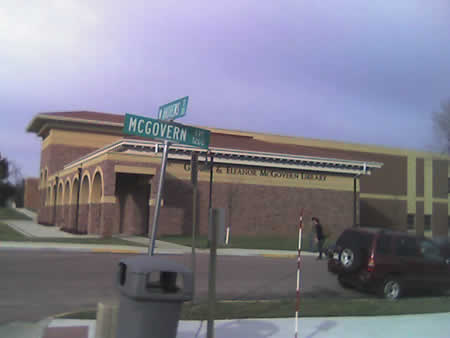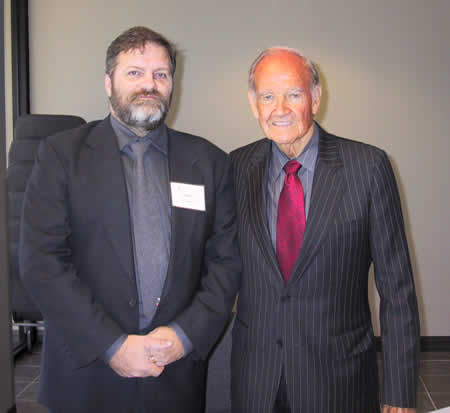
I noticed as I was returning to/re-leaving Sioux Falls, South Dakota Monday night that there was a sign on the highway outside town mentioning that it was the hometown of Senator John Thune, the Republican who beat former Democratic Senate Majority Leader Tom Daschle in 2004. I may have missed it due to the lateness of the hour, but I didn’t see any such sign outside of Mitchell.
On the campus of Dakota Wesleyan University, however, it’s nigh on impossible to miss McGovern’s name, even if you’re not headed for a conference in his honor. It’s a small campus with fewer than 800 students; smaller than Reed College was twenty years ago when I was there. The grounds are flat and open, and one of the largest buildings at DWU is the McGovern Library,which has his name in big metal letters at the top on two sides of one corner. It was dedicated and opened just last year.
As I was walking across McGovern Avenue toward the Sherman Center where the conference was to be held, I recognized Bruce Miroff, the author of the recently-published The Liberals’ Moment: The McGovern Insurgency and the Identity Crisis of the Democratic Party, and introduced myself.
DWU President Robert Duffett opened the conference, welcoming what looked to me like between 150 and 200 people. The school choir sang a tribute to Eleanor McGovern, who met her husband on the DWU campus and who died early this year. Then Donald Simmons, the Director of the McGovern Center for Leadership and Public Service kicked off the show.
A panel of 1972 McGovern campaign staffers discussed how their youthful association with the Senator had influenced their lives and their careers. Mary Fifield told of how she had been inspired to leave college and join McGovern’s team in New Hampshire and Massachusetts despite being just weeks short of her degree. Teresa Petrovic worked as the campaign headquarters’ receptionist and has recently decided to return to public service work in Washington. The panel struck a refrain that echoed throughout the day, about the pride most McGovern workers feel in looking back at their work in 1971 and 1972, compared to the attitudes of people on other campaigns since then (both Democratic and Republican), but especially the 1972 Nixon campaign workers. I certainly believe the idealism is there, as well as a willingness to talk about the job they did, but I wonder if perhaps it’s just that nobody’s asking the Nixon people about their pride. Maybe they chortle about it whenever they aren’t screwing over new elections.
The first speaker was historian Donald Critchlow, who’s made chronicling the conservative movement his specialty. He started off with a comment on the unorthodox success of the early McGovern campaign which drew applause, but set the tone for the rest of his talk by following that by saying it would probably be the last he would receive. His presentation was titled after his latest book: “The Conservative Ascendancy: How the GOP Right Made Political History” but it was difficult to tell from his (at times accurate) portrayal of the Democrats as unable (or unwilling) to capitalize on chinks in the Republican message whether the right’s ascendency should be credited to Republican organizational skills or the Democrats choice of issues (gay rights, abortion, etc.) Critchlow laid the blame for the introduction of “values” and “character” directly on the 1972 McGovern campaign. Seemingly, everything the Democrats did since “The ’60s” was done to alienate the American populace which is “center right”, etc. etc. etc.
In the Q&A session after his talk, I asked Critchlow what part the right’s willingness to use extra-legal means against their opponents might have in the equation. He slid away from the question with a “politics is a dirty business” type of answer, then went back into the cant about how the problem with the Democrats is that they’re not enough like the Republicans, but seeing as we were at an event honoring a man whose opponent in the presidential campaign was forced to resign because of his abuse of power in using government agencies to harass and intimidate political opponents, and who had even planned to plant McGovern literature in the apartment of an attempted assassin, I didn’t feel Critchlow had answered my question. When he got to the last part of his answer, where he once again recited the litany of Democratic programs that had turned America to the Republicans, I added “and civil rights”, something that seemed conspicuously absent from his list, but one which certainly was recognized by Lyndon Johnson as a divisive issue and one that has been used repeatedly by the GOP as a cow bell for a certain type of voter.
There was a weird electrical vortex in Mitchell. I wasn’t able to get a signal on my cell phone despite the fact that it’s supposed to be in Sprint’s coverage area, and the minute after I got a shot of myself with the Senator, my camera stopped saving pictures to memory.
More from the McGovern Conference later.
